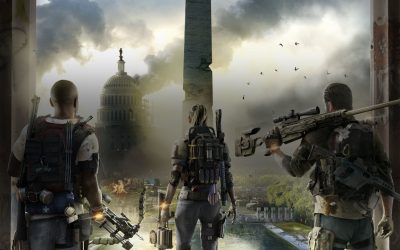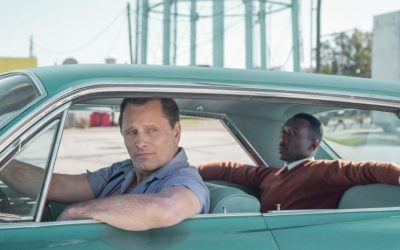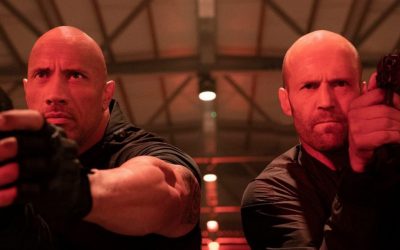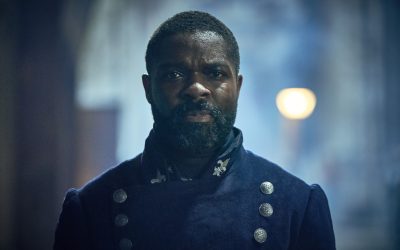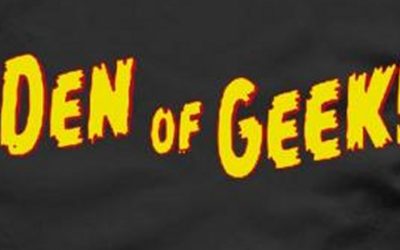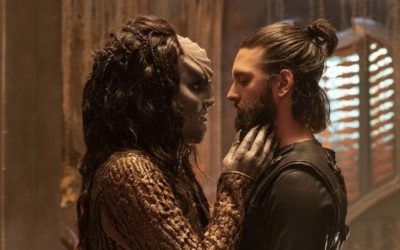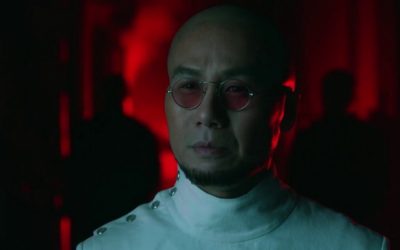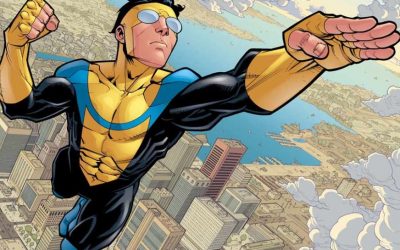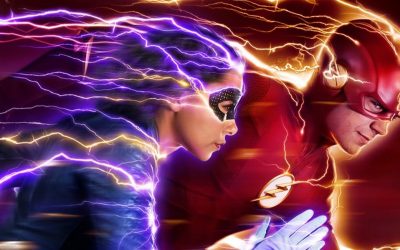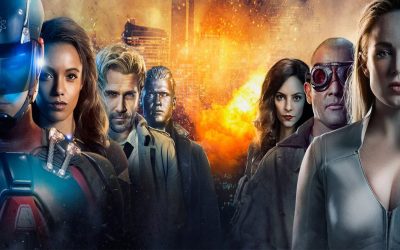
The Division 2: Ubisoft apologises for controversial email
Matthew Byrd
Feb 4, 2019
A recent email for The Division 2, taking a pot shot at the US government, resulted in a quick apology from Ubisoft
Ubisoft has apologised for a recent promotional email for The Divisi…
The Division 2: Ubisoft apologises for controversial email
Matthew Byrd
Feb 4, 2019
A recent email for The Division 2, taking a pot shot at the US government, resulted in a quick apology from Ubisoft
Ubisoft has apologised for a recent promotional email for The Divisi…
Green Book review: Hollywood sentimental but still adorable
Peter Farrelly’s race relations road trip bromance is lifted by its stand out performances.
“It takes courage to change people’s hearts” runs the central theme (and killer third act quote) of Green Book, a story inspired by true life events which tells the tale of black musician Doctor Don Shirley touring the American south when racism was rife in the 1960s with his Italian-American driver Tony ‘Lip’ Vallelonga.
Turns out, in this case, it takes a dignified and classy performance by Mahershala Ali and a load of fairly schmaltzy but nonetheless effective feel-good cliches to hit at the heart-strings in a way that’s both moving and manipulative at the same time.
Green Book has snapped up a range of awards and nominations, as well as several criticisms and controversies relating to how true the story is, whether the film sidelines Shirley to make the story about Vallelonga’s arc, and whether it skirts over the importance and history of The Negro Motorist Green Book of the title, a guide book of restaurants and accommodation friendly to black people.
Putting aside the politics, we’re still not convinced this is the uplifting masterpiece of our times deserving all the awards buzz. But you’d have to be pretty hard-hearted not to find this Christmas-set bromance at least somewhat touching.
Doctor Don Shirley was a classically trained pianist who according to the film had to settle for playing jazz and standards to maintain a successful career in music venues in New York. But Shirley wanted to tour the deep South during the era of Jim Crow laws.
Vallelonga was a nightclub bouncer who found himself out of work when his club shuts for a refurb and ends up (reluctantly) agreeing to travel with Shirley as a driver, valet and bodyguard.
Mortensen plays Vallelonga as corporeal and crass, constantly filling his face, a sort of unrefined slob in contrast to the posh, finickity and up-tight Shirley. Green Book is an odd-couple comedy and while director Peter Farrelly is best known for slapstick fare such as Dumb And Dumber and There’s Something About Mary, appropriately Green Book is much gentler in tone. It’s also not hilarious, so when we say ‘comedy’ don’t expect to be rolling in the aisles.
Green Book establishes Vallelonga as an out and out racist at the start of the film, with the character binning the glasses that two black maintenance men were drinking from in his house, where his considerably less bigoted wife (Linda Cardellini) has served them Lemonade. But as Vallelonga and Shirley travel through the South, Vallelonga’s prejudice diminshes as his awareness quickly grows – it’s a slightly uncomfortable shift over an apparently very short period of time that the movie brushes over.
Green Book is predictable, taking the pair on a road trip of racism – in one town they won’t let Shirley shop, in the next he can’t use the ‘white’ bathroom, in the next he’s denied access to the restaurant etc. And the focus is definitely on Vallelonga’s arc of understanding and not Shirley’s point of view or act of bravery in choosing to make the tour in the first place (at least not until act three) – hardly surprising perhaps since the screenplay was co-written by Vallelonga’s son Nick. Shirley’s sexuality is skirted over via just one scene, too, in a way that seems to say ‘this isn’t that movie’, while Cardellini is great but underused and the other women in the film are largely confined to nagging wife roles.
Still, excellent, nuanced performances from both leads elevate the movie above its good natured but rather bog-standard, neatly packaged beats and when the third act comes around it’s hard not to feel deeply for both characters. As a well made, sweet, story of unlikely friendship, Green Book is as warm, palatable and enjoyable as the fried chicken Vallelonga hungrily devours as he’s driving, much to Shirley’s initial distaste. Just don’t expect too much to chew on afterwards.
Green Book is in UK cinemas now.
First Fast & Furious Presents: Hobbs & Shaw trailer arrives
Dwayne Johnson and Jason Statham gear up for one of the summer’s biggest blockbusters…
It’s finally here! The Rock and The Stath are taking their Fast & Furious bromance to the next level in Hobbs & Shaw (the filmmakers do love an ampersand, don’t they?) – and now we have our first proper look at the boys back in action.
Spinning off from their successful onscreen pairing in the last couple of Fast & Furious movies, Hobbs & Shaw sees maverick federal agent Luke Hobbs (Dwayne Johnson) and evil mastermind turned sort-of goodie Deckard Shaw (Jason Statham) continue their alliance, this time to take down Idris Elba’s “superhuman, bulletproof” terrorist Brixton – the “necessary shock to the system”, as he likes to call himself.
Joining the lads on their mission is The Crown and Mission: Impossible – Fallout star Vanessa Kirby as Hattie Shaw, an MI6 agent who also happens to be Deckard’s sis. You can watch the trailer below…
It looks like an awesomely action-stuffed, globetrotting adventure, with producer Hiram Garcia revealing on Instagram that the film will take the boys from the US to the UK via Russia, Ukraine and Samoa.
Director David Leitch (John Wick, Atomic Blonde, Deadpool 2) has promised that the film will be “a little bit more grounded” and “more character-centric” than the last couple of Fast outings. That set-piece on the side of a glass skyscraper doesn’t exactly scream “grounded” to us, but it does look like a lot of fun – especially with the film seemingly playing up the comedy of the central duo’s grudging partnership.
Fast & Furious Presents: Hobbs & Shaw is due to hit cinemas on 2 August 2019.
Les Miserables episode 6 review: a triumphant, tragic conclusion
Louisa Mellor
Feb 3, 2019
Les Miserables’ emotional extended finale provides everything you could ask this glorious adaptation for. Spoilers ahead in our review…
This review contains spoilers. See related&…
Geeks Vs Loneliness: Snooker loopy
Anna Cale
Feb 1, 2019
How a teenage obsession with snooker helped Anna to find her identity and make connections with people when it mattered most…
In April 1992, I was busy revising for my mock GCSEs. I say rev…
Star Trek: Discovery season 2 episode 3 review: Point Of Light
Star Trek: Discovery becomes an uneven soap opera as we revisit L’Rell, TyVoq, and the Klingon homeworld. Spoilers ahead…
This review contains spoilers.
2.3 Point Of Light
On some level, Star Trek is meant to be a story about utopia. As we are not yet living in a utopia and the culture of Hollywood reflects that, all attempts to tell a story about utopia within the Star Trek franchise have fallen short—but that doesn’t mean it’s not been a fascinating and worthwhile ambition. In watching the latest episode of Star Trek: Discovery, I couldn’t get over how far from that ambition this show has strayed in how it chooses to depict the Federation.
Ostensibly, Point Of Light is about the continued investigation into the mystery of the red signals. So far, using this mystery as a way to link the episodes and disparate storylines together has worked. Unfortunately, Discovery continues the serialised mystery here by character-assassinating not one, but two The Original Series characters; giving us a Klingon soap opera that works on zero levels; and touching far too briefly on how Section 31 fits into the Federation.
L’Rell holds onto power… I guess
When we found out that L’Rell would be assuming power over the Klingon Empire in the season one finale, it was an intriguing idea. This is how her storyline was set up for season two. Sadly, judging by Point Of Light, Discovery is not actually interested in telling a story about a woman in power. We’ve no sooner checked back in with L’Rell and her confidante/former lover TyVoq, then the storyline turns into a badly done soap opera plot (because, yes, soap opera plots can be freaking masterpieces) involving secret children, baby hostage-taking, rendezvous with ex-lovers, and murder.
Discovery has a chance to tell a story about the Klingon, but Qo’noS never comes off feeling like a real place filled with a real culture or cultures. There are, like, 12 dudes who seem to skulk amongst the fire and the shadows they cast. As far as I can tell, L’Rell is the only lady Klingon on the planet and, if the way her child is treated in this episode is anything to go by, the Klingons have never seen a baby before. There is no sign of the parts of Qo’noS we saw in the season one finale, nor any attempt to depict how L’Rell’s rule is being judged by the people outside of the ruling families.
Until now, the Klingons have been depicted as having a code of honour that they live by. Here, they seem to be savage, power-hungry, and murderous for the sake of it. It’s an insulting, problematic depiction. (I know the Klingons are meant to be a stand-in for racist Trump supporters in this universe, but you can’t divorce these characters from the colonialist myth of the warrior race.) There is no honour to be found here, and L’Rell and Tyler are the only Klingon character who are shown as having any kind of nuance.
Not everything that happens between L’Rell and TyVoq is a bust. It’s interesting to see these two grapple with what their relationship means when Voq is neither completely there, nor completely gone. The show makes some effort to address the deeply uncomfortable consent issues that were so poorly explored last season in the Tyler/L’Rell relationship, when TyVoq relays that L’Rell’s kiss feels like a violation. They treat each other with an empathy that says a lot about the Klingon capacity for such things in an episode that gives us so little nuance to its Klingon depiction elsewhere.
And then we find out about the baby. It’s bad enough that the show seems to have retconned this baby into the plot, coming up with an ex-utero explanation for why L’Rell was not visibly pregnant last season, but it still comes out of left field and is poorly handled. When the baby is kidnapped by one of L’Rell’s chief critics in a bid for the power she controls, L’Rell shows up to the hostage exchange. However, the Klingon captor immediately lets the baby go and they fight instead, basically negating the purpose of kidnapping the baby and threatening his life in the first place.
It’s also unclear why L’Rell cares about the baby. There’s this assumption that all mothers must inherently care about their children, but L’Rell doesn’t have any interest in even seeing her baby before TyVoq finds out about him. I would have kind of loved it if, when the baby was taken, L’Rell was like: Um, I care about my power more? Sure, it would have been harsh, but it would have told us something real about this character.
Discovery makes a lot of assumptions about power, love, vulnerability, and motherhood in this episode, and none of them sit well. Later, when Emperor Georgiou shows up to ensure that L’Rell holds onto the Klingon seat of power, she gives a rant on the sacrifice childrearing takes. It’s meant to expose her as a villain, but it’s a pretty radically astute observation to make. Finding someone to feed your child does give you more time to do other stuff and I was hoping that, by the time the 23rd century rolled around, we’d have come up with some better ways to free women from the emotional and physical burden of assumed childrearing.
But, I digress… Eventually, L’Rell sends TyVoq and Baby Klingon (who still doesn’t have a name) away, faking their deaths, seemingly because Georgiou made her, further robbing her of any power she has in the narrative. The storyline culminates with an uncomfortable speech in which L’Rell holds up the twin (fake) decapitated heads of her lover and baby to the Klingon assembly, vowing never to have another child and asking them to call her mother. It’s all very weird and, in the context of L’Rell and this show’s own murky relationship with motherhood, very confusing.
Let’s talk about Georgiou’s appearance…
It’s impossible to not welcome Michelle Yeoh’s appearance on the scene—and the matter-of-fact conversation she has with L’Rell about possibly killing Tyler and her small child is kind of amazing—it just doesn’t really address the fact that the Federation is apparently sanctioning baby murder now?
There’s potential for the intense interrogation of some real-world parallels here, if Discovery truly wanted to commit to it. Here, Section 31 feels like a parallel to our real-world CIA and to their pattern of human rights violations in the name of American security, dominance, and freedom. Perhaps the planned Discovery spin-off starring Michelle Yeoh will explore this, but, here, it is left problematically ambiguous.
How does Discovery the show feel about the existence of Section 31? Are they OK with it? Are they cool with baby murder? Because Georgiou seemed ready to straight-up murder L’Rell and Tyler’s child. It’s unclear whose idea to fake the murders might have been. Could have been Georgiou’s, I suppose, given the throwaway line about the resources of Section 31, but apparently this wasn’t an important enough part of the plot to show? Give me something, anything to work with, Discovery.
Spock is maybe a psychopath?
Meanwhile, back on Discovery, Amanda Grayson (aka Spock and Michael’s mother) shows up to ask for Michael’s help in finding Spock. It turns out the good people over on Starbase 5 would give her no information about Spock, even though she is his next of kin. So, Amanda did the only logical thing. Used her sway as a diplomat’s wife to secure the information? No, she stole the file.
Michael insists on bringing the file to Captain Pike, who is initially hesitant to hack into it, given that it probably breaks a bunch of Federation laws, not to mention Spock’s personal wishes. However, when the chief over at Starbase 5 informs Pike that Spock murdered three people and then made a break for it, his tune changes. (Very Captain Kirk of him.)
What follows is so much exposition about Spock and Michael’s childhood, including Amanda’s musings on why she failed as a mother. She never encouraged Spock’s emotional intelligence, honouring Sarek’s wishes to raise him in the Vulcan way. Frankly, this is bullshit. If Spock murdered three people, maybe he had a good reason. Maybe he has a legitimate mental illness. Either way, it’s not Amanda’s fault. Spock is an adult and should be held accountable for his own actions.
If it’s not Amanda’s fault that Spock maybe murdered three people, then it is definitely not Michael’s fault. Michael also tries to take the blame for Spock’s apparent empathy deficiencies, as she intentionally hurt him when they were kids. Apparently, after the Logic Extremists tried to kill Young Michael, she had to come up with a way to keep Spock away from her, to keep Spock safe. So, she hurt him emotionally to save him.
Amanda does not take this news well, telling Michael she will be the one to find Spock and kind of giving her the cold shoulder. Which: not cool, Mom. Michael was a child orphan who had just survived an assassination attempt. Maybe don’t put this on her? (Though, I’m not sure how Michael has not cleared this up in the last decade or so. I know Spock hasn’t been taking her phone calls, but still.)
All of this is in the context of Discovery trying to create dramatic tension by working to convince us that Spock is a psycopath—something that, anyone who has watched any of The Original Series, knows isn’t true. Past that, Discovery keeps conflating a lack of external emotional reaction with a lack of empathy. They’re not the same thing, a knowledge that Spock’s character and the Vulcan race as a concept have been built on.
The important takeaway from all of this, I guess? Spock saw the red angel when he was a kid. The entity told him where a runaway Burnham was, so that he could tell his parents and she could be returned safely home.
Tilly gets rid of May
In what was the most successful storyline for me, Tilly continues to see the “ghost” of her old school friend May. There’s never a good time to get a fungal parasite that won’t leave you alone, but Tilly’s infestation happens to coincide with the ramping up of the command track programme.
That said, it was disappointing to see Tilly’s crew mates react so poorly and ineffectively to the situation. This is a person who recently had a head injury and who is displaying symptoms of mental illness, but everyone just stares at her, not sure what to do. They don’t escort her to sickbay. And, when they finally figure out what went wrong, she worries aloud to Saru that Pike will hold this against her, even though it was because she was infected by a fungal parasite and really not something she should have to apologise for.
If the Federation is meant to be some kind of utopia, then why is their culture surrounding mental health still so poor? This is echoed by the Spock storyline, in which everyone seems adamant on keeping Spock’s self-admittance to a psychiatric facility a secret, as if it is something to be ashamed by. I really hope we’ve moved past this by the 23rd century.
It would have been nice to see Tilly develop a bit more of a relationship with Dark Matter May, perhaps like the one she did in her Short Trek with the visiting queen, though it is understandable why she did not. The episode reminded me a bit of The Next Generation hour “Imaginary Friend,” which sees a girl named Clara becoming best friends with an imaginary person who actually turns out to be an energy-based lifeform from a nearby nebula.
Both Clara and Captain Picard treat the entity with a considerable amount of empathy, even though her presence there threatens the ship. They seek to understand her and, in the end, it is the being’s friendship with Clara that keeps the ship safe.
Discovery did not take this approach in its storytelling. Tilly doesn’t ask Dark Matter May any questions and, when Stamets and Saru find out about the entity’s existence, they don’t attempt to communicate with it through Tilly. The resulting storyline is still an affecting one, as we care about Tilly and what happens to her, but it would have been interesting to see May and her relationship with Tilly take on some more nuance.
In conclusion…
Star Trek: Discovery does not need to interrogate utopia to be a Star Trek story. That is my idea of what Star Trek is, but that does not mean it is the sole vision. That being said, more and more, it feels like Discovery doesn’t have a cohesive vision at all. I don’t need Discovery to be my vision of what a Star Trek story should be—at this point, I just need it to be someone‘s vision.
As Discovery exists now, it just feels like this show is continuing to throw spaghetti at the wall and, sadly, not much of it is sticking. We are living in a time when to imagine what utopia might look like is a radical act. Unfortunately, Discovery seems committed to reinforcing the status quo.
Read Kayti’s review of the previous episode, New Eden, here.
Gotham season 5 episode 5 review: Pena Dura
Marc Buxton
Feb 1, 2019
Gotham begins to get a little lost in all its layers in the latest season 5 episode, Pena Dura. Spoilers ahead in our review…
This review contains spoilers. See related
…
Dr. Mario World: release date for Nintendo mobile game set
Dr. Mario World, Nintendo’s next mobile game, will debut this summer.
Another Nintendo franchise is making the leap to mobile, as Nintendo has revealed Dr. Mario World.
Dr. Mario World will be developed by Nintendo, LINE Corporation and NHN Entertainment. According to a recent tweet, Nintendo is targeting a summer 2019 release date for the mobile title. It is expected to receive a global release for iOS and Android at that time.
Details on the game itself are few and far between, but it’s believed that Dr. Mario World will be a free-to-play title that features microtransactions. It seems that the game will be a puzzle title like the previous entries in the series, but Nintendo hasn’t shared any further details about the specifics of its gameplay at this time. That being said, we’d be absolutely shocked if this doesn’t turn out to be a match-three puzzle game or some other title very similar to the other major entries in the Dr. Mario franchise.
Besides, it makes too much sense for the mobile version of Dr. Mario to play very similarly to the other games in the Dr. Mario franchise when you consider how well puzzle titles (Candy Crush, anyone?) do on that market. However, we can’t help but be a little worried about the mention of microtransactions. There’s not much room for microtransactions in previous Dr. Mario games, which would tend to suggest that Dr. Mario might actually incorporate the more unfortunate pay-to-play-more elements of popular mobile titles like Candy Crush.
Nintendo’s foray into mobile gaming has certainly been interesting thus far. Nobody can deny the success of Pokemon GO, but outside of that, things have been a bit more hit and miss. It’s not entirely clear just how successful Fire Emblem Heroes and Animal Crossing: Pocket Camp are, but Super Mario Run and Miitomo seem to have fallen short of the company’s expectations. The company certainly hopes that Dr. Mario World and the recently delayed Mario Kart Tour will perform better.
In any case, Nintendo’s new president has made it clear that he’s interested in venturing further into the world of mobile titles, so don’t expect these games to go anywhere anytime soon.
Invincible: voice cast for Amazon series revealed
Robert Kirkman’s Invincible is heading to Amazon with an incredible cast of voice actors.
The first cast members for Robert Kirkman’s animated Amazon series Invincible have been revealed, and the show is shaping up to be a star-studded affair.
The remarkable full cast includes a leading performance by Steven Yeun (who will somewhat reunite with Kirkman from his time on The Walking Dead), J.K. Simmons, Sandra Oh, Seth Rogen, Gillian Jacobs, Andrew Rannells, Zazie Beetz, Mark Hamill, Walton Goggins, Jason Mantzoukas, Mae Whitman, Chris Diamantopoulos, and more. While only a handful of the original roles have been confirmed at this time, it’s already clear that no costs were spared in assembling this roster of voice talent.
For those who don’t know, Invincible is an upcoming eight-episode adaptation of Robert Kirkman’s comic series of the same name. Yeun will play leading man Mark Grayson who just so happens to be the son of the world’s most powerful superhero, Omni-Man (appropriately played by Simmons). The already completed comic series deals with Grayson as he begins his own superhero career and discovers that his father’s work and reputation might not be quite so simple as they seemed to be.
Robert Kirkman’s Skybound production company will be producing the series, but Simon Racioppa (Teen Titans) will be handling showrunner duties. The full list of producers and supporting staff includes talent from series such as The Walking Dead, Star Wars: The Clone Wars, and Ultimate Spider-Man.
Interestingly, it was reported in 2017 that Seth Rogen and Evan Goldberg had signed on to write and direct a film adaptation of Invincible. At this time, it’s not clear whether or not this series is intended to replace that project or whether it will serve as some kind of companion to the movie. Given the talent and producers involved, though, it’s entirely possible that attention has been shifted to the series.
Invincible is set to debut on Amazon sometime in 2020.
The Flash has been renewed for season 6
John Saavedra
Feb 1, 2019
The Flash will return for season 6! Here are the details…
The Flash has been renewed for season 6! That means way more speedster shenanigans and time-traveling adventures with Barry …
Legends of Tomorrow season 5 renewal announced
Kayti Burt
Feb 1, 2019
Legends of Tomorrow will be returning for season 5…
Legends Of Tomorrow, arguably the best superhero show on The CW (yep, I said it), has been renewed for another season. Yes, friends, …

